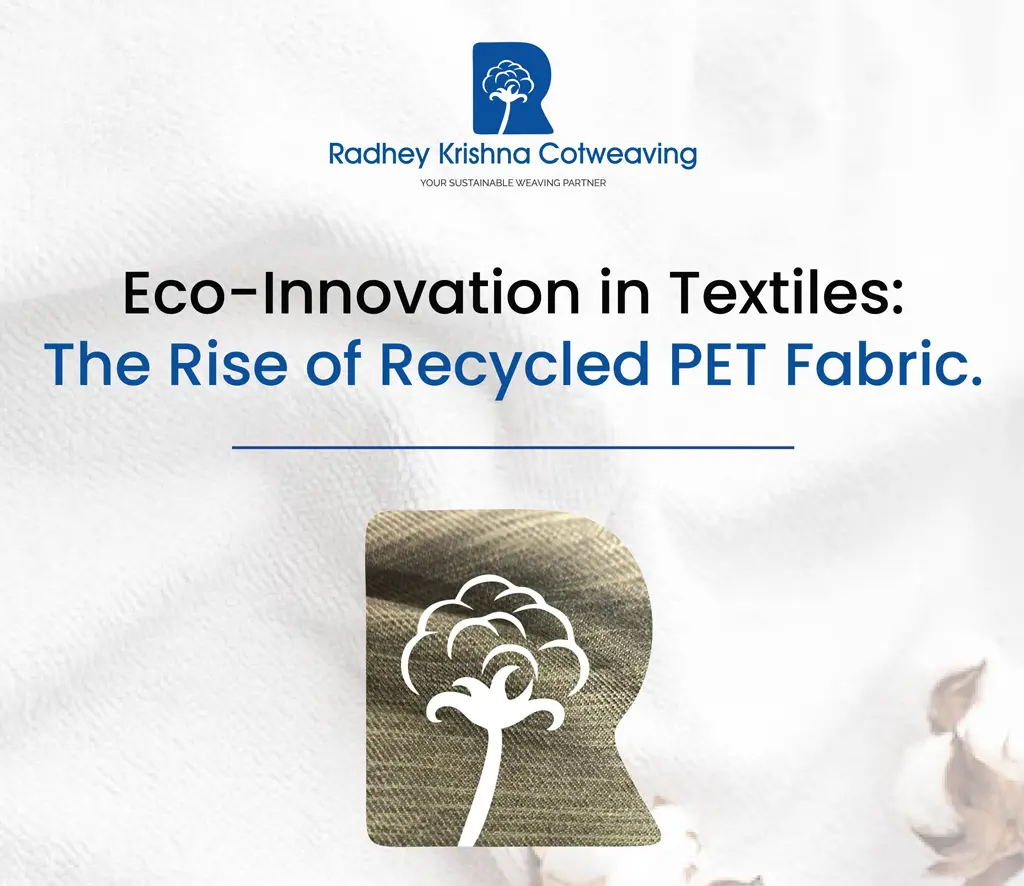- Home
- About
- Products
Single Fill Duck
Army Duck Fabric
Numbered Duck
- 200 GSM Cotton Polyester Mix Canvas Fabric
- 220 GSM Cotton Polyester Mix Canvas Fabric
- 290 GSM Cotton Polyester Mix Canvas Fabric
- 295 GSM Cotton Polyester Mix Canvas Fabric
- 315 GSM Cotton Polyester Mix Canvas Fabric
- 375 GSM Cotton Polyester Mix Canvas Fabric
- 390 GSM Cotton Polyester Mix Canvas Fabric
- 470 GSM Cotton Polyester Mix Canvas Fabric
- Eco Weav
- Re Weav
- Certificates
- Contact Us

Eco-Innovation in Textiles: The Rise of Recycled PET Fabric
In today’s textile industry, the shift toward sustainability is not just a trend but a critical transformation. Recycled PET fabric is at the forefront of this movement, offering a powerful solution to reduce environmental impact. Radhey Krishna Cotweaving, a leading recycled PET fabric manufacturer in India, exemplifies commitment to this green revolution.
Holding esteemed GRS and RCS certifications, Radhey Krishna Cotweaving skillfully converts discarded plastic bottles into premium fabrics, seamlessly blending innovative practices with a commitment to environmental care. This blog explores how Radhey Krishna Cotweaving is driving the change towards sustainable fashion, making it possible for the industry to embrace eco-friendliness without compromising on style or quality.
The Global Demand for Recycled PET Fabric
What is Recycled PET Fabric? Recycled PET Bottle fabric, made from plastic bottles transformed into textile fibres, is gaining significant attention globally. As consumer awareness about environmental issues grows, so does the demand for products made from sustainable materials. Recycled fabric not only helps reduce plastic waste but also consumes less water and energy compared to virgin polyester production, making it a favored choice among eco-conscious brands and consumers.
Radhey Krishna Cotweaving's Sustainable Practices
At the heart of Kishangarh, Rajasthan, Radhey Krishna Cotweaving has established itself as a frontrunner in the production of recycled PET Bottle fabric. The company is proudly certified by the Global Recycled Standard (GRS) and the Recycled Claim Standard (RCS), which are testimonies to its adherence to stringent environmental and social criteria. By opting for GRS-certified products, Radhey Krishna Cotweaving is committed to increasing the use of recycled materials, reducing harm from production processes, and ensuring traceability and responsibility at every step of their manufacturing.
How Recycled PET Fabric is Made
The journey from Recyled PET bottles into fabric involves several innovative and sustainable steps. Initially, discarded PET bottles are collected, cleaned, and shredded into small flakes. These flakes are then melted down and spun into fibers that can be woven into fabrics. Radhey Krishna Cotweaving utilizes cutting-edge technology to ensure that this process is efficient and environmentally friendly, maintaining high standards of quality while minimizing the ecological footprint.
Benefits of Recycled PET Fabric
Choosing RPET fabric from Recycled Fabric manufacturers offers numerous benefits:
- Environmental Impact: It significantly reduces landfill waste and the depletion of natural resources.
- Energy Efficiency: Producing recycled PET fabric requires less energy than producing new polyester, leading to a lower overall carbon footprint.
- Water Conservation: The recycling process of PET into fabric generally consumes less water compared to traditional fabric production methods.
- Quality and Durability: RPET fabrics are high-quality and can be just as durable and versatile as their non-recycled counterparts, suitable for a wide range of applications from clothing to home furnishings.
Radhey Krishna Cotweaving's Role in Promoting Eco-Friendly Fashion
Through its innovative practices, Radhey Krishna Cotweaving is not just a manufacturer but a trendsetter in the sustainable fashion movement. The company is a leading PET Recycled Fabric supplier offering a variety of fabrics made from recycled PET, each bearing the marks of excellent craftsmanship and environmental responsibility. By providing these sustainable fabric options, Radhey Krishna Cotweaving is enabling fashion brands around the world to meet the growing demand for eco-friendly products.
Challenges and Future of Recycled PET Fabric
Conclusion
The adoption of recycled PET Bottle fabric is a critical step towards a sustainable future in textile manufacturing. Radhey Krishna Cotweaving, with its commitment to quality and sustainability, stands at the forefront of this industry shift. By supporting GRS and RCS-certified manufacturers like Radhey Krishna Cotweaving, consumers and businesses not only foster the growth of environmentally friendly practices but also contribute to the larger goal of reducing the fashion industry’s impact on our planet.
Join the Sustainable Revolution with Radhey Krishna Cotweaving
Embrace the future of fashion by choosing Radhey Krishna Cotweaving, your trusted RPET fabric manufacturer in India. Explore our wide range of sustainable fabrics and join us in our journey towards a greener, more responsible fashion industry. Contact us today to learn more about our products and how we can help you achieve your sustainability goals.

